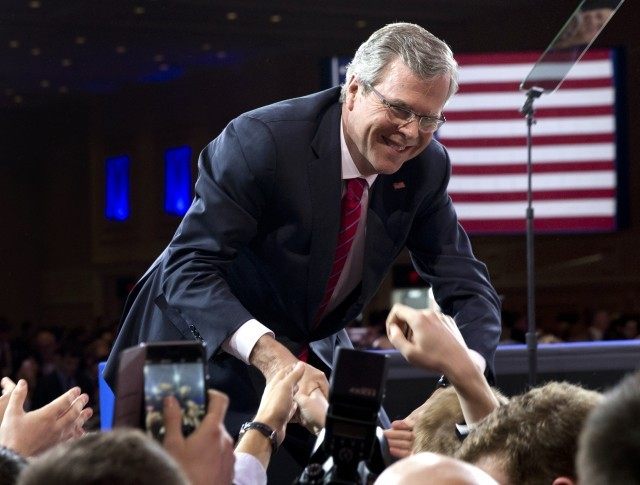WASHINGTON (AP) — Fulfilling ambitions to raise a historic amount of money in pursuit of the White House, Republican presidential candidate Jeb Bush and his allies took full advantage of the nation’s evolving campaign finance laws to collect more than $114 million in the first six months of the year.
No candidate for president has benefited from so much money so early in a campaign.
While the total is sure to widely eclipse the fundraising hauls of Bush’s 16 major competitors for the GOP nomination, the ambitious $100 million goal – and Bush’s success at reaching it on schedule – has yet to scare any challenger from the race.
The total announced Thursday includes $103 million raised by Right to Rise, a super PAC that will support Bush in the crowded GOP contest. The rest came into Bush’s formal campaign.
“More than the symbolism of surpassing $100 million, the totals demonstrate Bush’s success charting new territory,” said Bush donor Mark Jacobs, a former Texas energy executive who now lives in Iowa. “It’s that Right to Rise has raised more and been more successful than any political organization ever.”
The former governor of Florida is taking a unique approach to a presidential bid by delegating many operations to Right to Rise, which as a super PAC is free of the limits placed on how much money a traditional campaign can raise from individual donors.
Designed with longtime aides Sally Bradshaw, Mike Murphy and others, it’s a strategy untested in modern politics, the outgrowth of court decisions in 2010 that led to the creation of the super PAC.
Based in Los Angeles, Right to Rise will handle a huge part of the costly work of running for president, including buying TV, online and radio commercials, conducting polling and even doing some organizing tasks such as voter outreach in early primary states.
By law, it can’t take direction from Bush’s Miami-based campaign, and the two operations have limits on how they can communicate. Bush’s official campaign and its markedly smaller bank account will pay for his travel and employee salaries, and give him a pot of money from which to craft messages exactly as he sees fit.
Right to Rise already is advertising on Bush’s behalf. It has spent $47,000 so far on digital media, according to documents filed this week with the Federal Election Commission. The group has also inquired with broadcast and cable stations in the early primary states about booking TV ad time.
Bush isn’t alone in counting on significant support from a super PAC. Texas Sen. Ted Cruz has raised $14.2 million for his campaign, while supporters have given his affiliated super PACs an additional $38 million.
The campaign of former technology executive Carly Fiorina has raised $1.4 million, but much of her day-to-day political messaging is coming through a super PAC that has pulled in more than twice as much.
Thursday’s announcement proved Bush’s strategy will set fundraising records.
Right to Rise’s haul of $103 million in six months exceeds the $79 million Priorities USA Action raised during the two-year 2012 election cycle to support the re-election of President Barack Obama, and is two-thirds of the $154 million raised by the super PAC backing Republican Mitt Romney in those years.
The son and brother of presidents, Bush said in December he planned to explore a campaign and then immediately set out to tap his and his family’s deep roster of experienced fundraisers and likely donors. With their help, he traveled the country raising money at events at which the suggested donation was often as much as $100,000 a person. At one point in the fundraising spree, Bush limited contributions to Right to Rise to no more than $1 million.
But Bill Kunkler, a Chicago private equity executive and Bush donor, said that while the Bush name may have opened some doors, it’s Jeb Bush who closed the deal.
“People have been willing to take a look, and he’s overcome the people who have said, `Not another Bush,'” Kunkler said Thursday. “People are looking at him as a guy who did it on his own, and who stands on his own.”
In announcing its fundraising Thursday, Right to Rise said it had about 9,400 donors who had given $25,000 or less, and about 500 who’d given more. Several major donors to Romney began turning toward Bush in January, and some would later raise $1 million at an event in Chicago that lasted just an hour. And in February, those same donors put together an event that brought in $4 million for the super PAC.
Bush’s formal campaign operates in far more restrictive territory. Individual donors can’t give more than $2,700 to the primary elections and, if Bush wins the GOP nomination, $2,700 he can spend in the general election.
After making his candidacy official on June 15, Bush’s campaign super-charged fundraising with a contest called “27 in Fifteen,” in which top supporters were encouraged to gather $27,000 worth of donations in the first 15 days of the campaign. Those who succeeded were being rewarded with a retreat this weekend at the Bush family compound in Kennebunkport, Maine.
The private gathering features an “evening picnic” with Bush and his parents, former President George H.W. Bush and Barbara Bush, and a morning “political and campaign briefing” with senior campaign officials.
In all, Bush’s campaign raised $11.4 million – or an average of $710,000 per day – through the end of June. They touted that daily average as more than the average of $562,000 per day raised by Democratic front-runner Hillary Rodham Clinton since she launched her campaign April 12. Clinton’s haul in that time totaled $45 million.

COMMENTS
Please let us know if you're having issues with commenting.